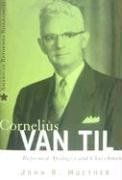Cornelius Van Til was arguably the most significant and yet most under-appreciated Christian apologist of the 20th century. That is so in part because his writings are not always easy to understand and he has often been viewed as a controversialist. John Muether provides a major corrective to those misperceptions in this new biography.
As part of the American Reformed Biographies series, which sets out to chart Reformed church history through biographies of key figures in that movement, Muether views Van Til primarily in light of his Presbyterian convictions and churchmanship.
Tracing out his family roots in the Reformed churches of the Netherlands, we are allowed to see the influences of Dutch Calvinism that were to shape Van Til in his early years, up to the time he began to study for the ministry in Calvin College in Grand Rapids, Michigan.
From there he went on to study in Princeton Seminary during the years of theological foment following the death of B. B. Warfield. On leaving Princeton, Van Til was ordained to the ministry of the Christian Reformed Church and served the Spring Lake, Michigan, congregation from 1927-1928 before taking up a teaching position at Princeton itself. He was to return to that same congregation just ten months later after resigning from the seminary. When Gresham Machen invited him to join the faculty of the newly-formed Westminster Seminary, it took more than a little persuasion to bring the Van Tils back East.
We are given a striking insight into the way Van Til’s early years of teaching in Westminster influenced his views on church polity. We see him embrace a Presbyterian understanding of the church – because of the coherence of its theological beliefs as much as its form of church government.
As we follow the unfolding story of Cornelius Van Til’s life we see how deeply it was interwoven with the development and impact of Reformed theology in North America. We see him in the great debates of that time – ranging from his polemic with Barth and Neo-Orthodoxy through to his debates with the New Evangelicalism associated with Fuller Seminary. But he also emerges as an increasingly influential figure within the Orthodox Presbyterian Church of which both he and his colleague, John Murray, were a part.
This book is a ‘must’ for anyone wanting a deeper insight into (1) the life and work of this significant figure in the world of Reformed apologetics; and (2) the issues that have defined the Reformed movement in the USA and beyond.
Mark G. Johnston
Camberwell, London




